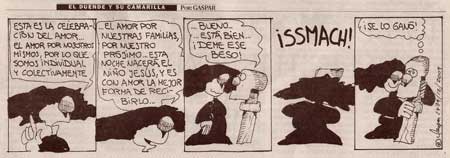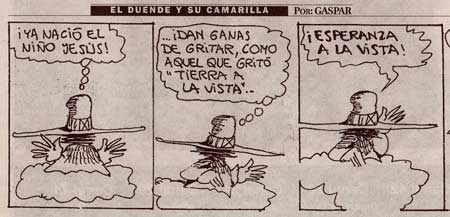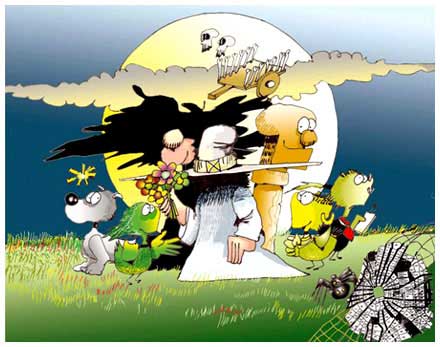'El Duende Y Su Camarilla' (El Deber, December 2009). Translation: "Baby Jesus is born! I want to scream like someone who spots land in sight: "Hope in sight!".
Oscar Barbery Suarez, who signs with the pseudonym Gaspar, is a Bolivian creative centipede, active in many fields, including poetry, theatre, novels, screenplay, editorial cartoons and comics. He is most famous for his long-running satirical gag series 'El Duende Y Su Camarilla' ("The Goblin and His Gang", 1982- ), which wrote history as the first known newspaper comic created on Bolivian soil. The contemplations of the Goblin and his eccentric friends entertained readers for more than four decades, providing political-social commentary. Gaspar also drew the political satire column 'Raspapinchete' (1989-1998). His work has sometimes caused controversy, but also received many awards.
Early life and career
Oscar Barbery Suarez, who uses the pseudonym Gaspar (and sometimes Raspapinchete) for his comics work, was born in 1954 in Santa Cruz de la Sierra. He was the son of politician and writer Barbery Justiniano. Barbery's mother worked as a teacher. While Barbery had literary aspirations, his father felt one couldn't make a living out of this profession and insisted that his son went into politics. Yet Barbery's grandfather paid for a written course in comic art, which Barbery completed. He went on to study Architecture in Córdoba, Argentina, and won fifth place at the National Architectural Humor contest. This motivated Barbery to become a writer, poet and cartoonist. Later in life, he married artist María Elena Busso, with whom he had two children: Óscar Guido (who also became an artist) and María Belén.
El Duende Y Su Camarilla
In 1982, Barbery was reading the popular gag comic 'Mafalda' by Argentine artist Quino. 'Mafalda' was created in a time when Argentina was a dictatorship, but offered stingy political-social commentary that the authorities didn't take seriously since it was "just a comic strip". Barbery felt Bolivia could use an equivalent. In his opinion, a political satirical comic could be a perfect alternative to traditional journalistic opinion pieces. Yet he encountered two problems. His home country had no comic strip tradition, since most comics in their papers were imported. Beyond that, many associated the medium with children's entertainment and therefore couldn't understand how a comic could have mature content. Barbery was lucky that the chief editor of newspaper El Deber was open to his proposal. And so, on 5 September 1982, the first gag of 'El Duende Y Su Camarilla' ("The Gnome and His Gang") appeared in its pages.
To make readers more receptive towards his comic, Barbery used characters from local folklore. The title character, El Duende ("The Goblin"), for instance, is a goblin or gnome. Stories about sneaky small beings who lived in the woods were very common in Bolivia. Contrary to the oral tradition, Barbery's gnome isn't malicious, but a friendly, playful, contemplative individual. Originally, he was drawn with a visible face, but Barbery felt it was more visually striking and mysterious if El Duende was hidden underneath his large saó hat. El Duende's dog is named Jacuú. La Viudita ("The Widow") is an old conservative, moralistic, yet slightly gossipy woman. Like most widows in Spanish Roman Catholic traditions, she always wears black, since she's in lifelong mourning. Her eyes are obscured by her large bushy hair. The Widow is in love with the permanently sad, shy, solemn and pessimistic El Mojón ("The Stone Man"). El Cairn plays the role of the straight man in many gags and often finds himself at the receiving end of the punchline. More black comedy is provided by characters from another folkloric tale, namely a ghostly chariot driven by skeletons in the sky who carry people's souls to the afterlife. The spider Araña Doña is a heroic spider character found in Caribbean and Latin American oral traditions, who also has a recurring role in 'El Duende y su Camarilla'. As the series continued, Barbery also created characters not derived from Bolivian folklore. The green parrot Asésoro is an advisor of politicians. Gaspar based her design on a real-life pony-tailed advisor he once observed. Asésoro's greatest fear is that politicians might no longer need her services, or as she puts it: "They might start thinking for themselves." Another colorful character is El Semáforo Intelligente: a talking traffic light.
El Duende: Success
Thanks to the novelty of being a home-made newspaper comic, Bolivian readers quickly fell in love with 'El Duende'. They liked the comedy, but above all, the political-satirical commentary. Just like Quino's 'Mafalda', 'El Duende' was launched in an era when the country was a dictatorship. For many of Barbery's fellow citizens, El Duende offered escapism, relief and an expression of their own frustrations. The series ran for more than 35 years, surviving the transition from dictatorship to democracy, though with occasional interruptions. Gags were compiled in various books, including 'El Duende Y Su Camarilla' (Cabildo, 1985).
El Duende: Controversy
As can be expected from a political satirical comic, 'El Duende' also caused controversy. On 24 August 2009, the cast members commented on the 'Plata Commando', a real-life ongoing military infrastructural plan to build a Ministery of the Bolivian Presidency. After two years, the first stone still hadn't been laid. The characters wonder about this situation, especially since President Evo Morales had raised the necessary funding for the project, but conclude that a plan to raise a building "isn't the same as one to steal money." General José Antonio Agreda Mendívil, head of the Bolivian Army and the Plata Commando, felt so offended by this gag that he sued the newspaper. The judge ruled in the paper's favor that this comic's episode wasn't libel, but Agreda Mendívil's lawyers contested the sentence. The case sparked a huge public debate about freedom of expression and several Bolivian graphic artists and cartoonists sent an open letter to defend Gaspar and freedom of expression. Among them Jorge Siles, Susana Villegas, Marco Tóxico, Joaquín Cuevas and Alejandro Archondo.
Raspapinchete
In 1989, Barbery also wrote and drew his own political satire column, 'Raspapinchete' (1989-1988) in Deber's Sunday supplement Deber Extra. Originally, they appeared as an 8-page supplement, completey created by himself for a period of two years. In 1991, it was reduced to just one page and continued for another eight years in El Deber's supplement section. The column was popular, but Barbery also received a few death threats from people offended by his political commentary.
'El Duende y su Camarilla'. Translation: "During the holidays, people's insecurity grows: they rob everywhere and at the moment you least expect. For instance, I was watching the prices and a witness of such an event." - "What happened?" - "They robbed my desire to buy."
Other literary activities
Barbery is also active as a novelist, poet, dramatist and screenplay writer. He wrote the 1988 theatre production 'Laberintos', which later became a television mini series. His play, 'En Cuatro', received the National Literary Award (2012). In 1991, he wrote the screenplay for the film 'Los Igualitarios'. Barbery also wrote novels like 'El Portavoz' (1987), 'Tu Nombre en Palo Escrito' (1991) and 'Ay Chabela' (1993). His humorous poetry collection, 'ABC: Guía de Costas' (1996) received a Muncipal Literary Award. Another poetry book by his hand is 'Luna Ático' (2015).
Recognition
The city council of Santa Cruz honored Barbery with a Medal of Merit (1997), for his contributions to national culture. He won a Muncipal Literary Award (1996) for his poetry and a general National Literary Award (2012). Barbery also won the National Theatre Award four times, respectively in 1987, 1991, 1993 and 2012. From 12 September until 2 November 2014, his work was subjection of a large exhibition at the Manzana 1 Espacio de Arte in Santa Cruz. From 13 November 2024 on, his work was also exhibited at the University of Santa Cruz.
On 30 September 2025, El Duende received a statue in front of the University of Santa Cruz, sculpted by Mariano Ramírez.
'El Duende y su Camarilla'. Translation: "It's the celebration of love. Love for ourselves, for whom we are as individuals and a group. Love for our families, for our close ones... it's the night baby Jesus was born and love is the best way to receive it." - "Good, that's fine. Give me a kiss!" - "I earned that."
'El Duende y su Camarilla'.





